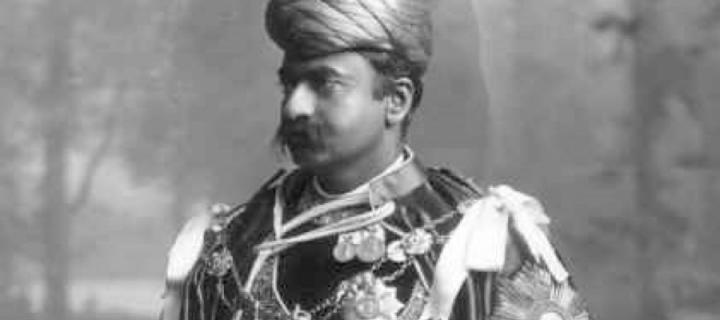Bhagvat Singh (1865 – 1944)
The world’s eighth longest serving monarch with a reputation for progressive thinking was also the only Maharaja to be awarded a degree.

Born Kumar Sri Bhagvatsinghji Sangramsinhji Sahib, Yuvaraja Sahib of Gondal, on 24 October 1865 in Dhoraji, Gujarat, India; Bhagvat Singh was the third and youngest son of the chieftain of Gondal and distantly related to the Jadeja dynasty, a clan who claim to being descended from the Hindu deity Krishna.
Young and gifted
In 1869, Bhagvatsinghji’s father Sagramji II died and, as his only surviving son, the four-year-old Bhagvatsinghji succeeded as ruler of Gondal.
Beginning his education at the Rajkumar College: an institution founded in 1868 for the academic advancement of the princely order, Bhagvatsinghji showed considerable promise and enthusiasm for learning and, in 1892 made the long journey to Scotland to begin a medical degree at the University of Edinburgh.
After graduating as a medical doctor in 1895, he became the first and only Indian ruler to become a Fellow of the Royal College of Physicians of Edinburgh.
A lifelong scholar
Despite competing responsibilities and commitments, Bhagvatsinghji sustained the academic career that had flourished at Edinburgh. He was appointed President of the Organising Committee of the 8th International Congress of Hygiene and Demography at Budapest in 1894 and rose to the position of Vice-President of the Indian Medical Association.
He also published ‘A Short history of Aryan Medical Science’ and published a dictionary of Gujarati and the first Gujarati encyclopaedia.
Reform and progress
Bhagvatsinghji is best remembered as one of the most progressive monarchs in Indian history. During his rule he abolished all rates, taxes, customs and export duties, restructured and developed the state administration and constructed hospitals, schools, colleges and training facilities for labourers.
His comprehensive programme of structural reform also included improved regional livestock through modern animal husbandry, new dams and irrigation networks, sewage, plumbing, rail systems, telegraphs, telephone cables and electricity.
His modern outlook also extended to women’s rights. As well as the introduction of free and compulsory education for men and women; he also abolished purdah for women and stopped the building of zenanas - part of a house reserved for the women and girls of a household - in future palaces.
A life lived
H.H. Maharaja Thakore Shri Sir Bhagwat Singhji Sagramji Sahib Bahadur, Maharaja of Gondal GCSI, GCIE ruled for 74 years and 87 days. During his reign he married four wives, had six sons and three daughters, attended the Coronation of King George V and, on the 50th anniversary of his accession to the throne, gave his weight in gold to charity.
He died in 1944 after passing on an enthusiasm for education to his children including his youngest two sons, Kiritsingh and Natwarsingh, who were both educated at the University of Edinburgh, and became directors of the state railways.

